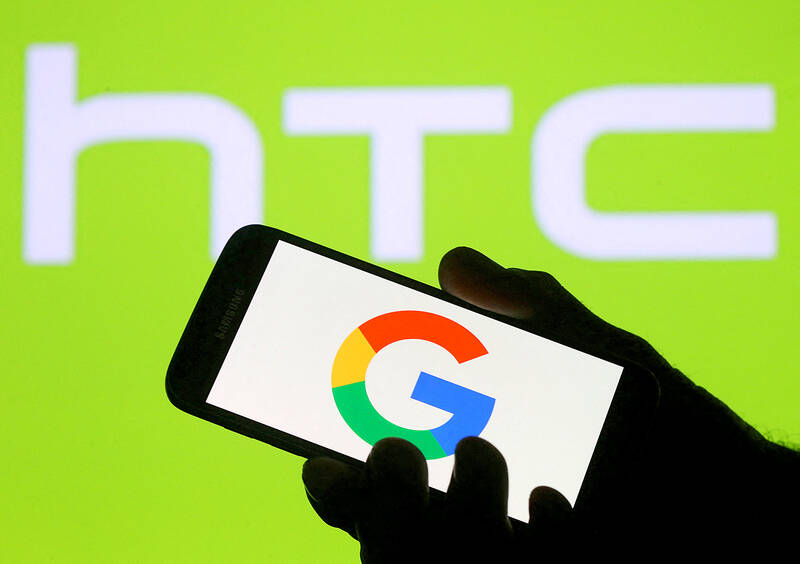HTC Corp (宏達電), which supplies VIVE virtual-reality (VR) headsets, yesterday said that Google LLC has agreed to buy its extended reality (XR) intellectual property (IP) and acquire some of its XR-related research and development (R&D) employees for US$250 million with an aim to expand its ecosystems of Android-based XR and smart glasses.
The agreement might be similar to a deal HTC clinched with Google in 2018. At the time, Google offered US$1.1 billion to acquire about 2,000 R&D workers, who helped create Google’s first Pixel phone, as well as access to IP owned by HTC.
The Taoyuan-based company yesterday declined to disclose the number of R&D workers involved in the XR-deal with Google.

Photo: Reuters
HTC believes it would still have sufficient R&D resources to develop new innovative products following the transaction, company spokesman Lu Chia-te (盧佳德) told a media briefing at the Taiwan Stock Exchange in Taipei.
Lu made the remarks in response to questions about whether HTC is capable of rolling out impressive products with a downsized R&D team, as the firm has substantially streamlined its smartphone business as a result of the disposal of the team in the Pixel deal.
At the end of March last year, HTC had hired 2,073 employees, with less than 2 percent holding a doctorate degree, the company’s annual report showed.
“This agreement reinforces HTC’s strategy of continued development around the XR ecosystem, enabling a more streamlined product portfolio with a focus on platforms, greater operational efficiency and financial flexibility,” Lu said.
“HTC’s commitment to deliver innovative VIVE XR solutions, such as the VIVE Focus Vision, remains unchanged, with existing product lines and solutions to be supported and developed without interruption,” he added.
The new deal with Google would grant the US technology giant non-exclusive access to HTC’s XR IP, meaning HTC would also have the right to utilize that IP to develop new XR devices, Lu said.
By utilizing HTC’s XR IP, Google would be able to accelerate the expansion of its Android-based VR headsets and smart glasses ecosystems, Lu said.
HTC would not rule out the possibility of exploring new partnerships with Google in the XR area, Lu said.
The companies are to wrap up the transaction this quarter, he said.
The company has been struggling to eke out a profit over the past six-and-half years. Losses widened to NT$2.6 billion (US$79.34 million) in the first three quarters of last year, compared with losses of NT$2.5 billion in the same period of 2023. That translated into losses of NT$3.12 per share, worsening from NT$3.01.

NEW IDENTITY: Known for its software, India has expanded into hardware, with its semiconductor industry growing from US$38bn in 2023 to US$45bn to US$50bn India on Saturday inaugurated its first semiconductor assembly and test facility, a milestone in the government’s push to reduce dependence on foreign chipmakers and stake a claim in a sector dominated by China. Indian Prime Minister Narendra Modi opened US firm Micron Technology Inc’s semiconductor assembly, test and packaging unit in his home state of Gujarat, hailing the “dawn of a new era” for India’s technology ambitions. “When young Indians look back in the future, they will see this decade as the turning point in our tech future,” Modi told the event, which was broadcast on his YouTube channel. The plant would convert

‘SEISMIC SHIFT’: The researcher forecast there would be about 1.1 billion mobile shipments this year, down from 1.26 billion the prior year and erasing years of gains The global smartphone market is expected to contract 12.9 percent this year due to the unprecedented memorychip shortage, marking “a crisis like no other,” researcher International Data Corp (IDC) said. The new forecast, a dramatic revision down from earlier estimates, gives the latest accounting of the ongoing memory crunch that is affecting every corner of the electronics industry. The demand for advanced memory to power artificial intelligence (AI) tasks has drained global supply until well into next year and jeopardizes the business model of many smartphone makers. IDC forecast about 1.1 billion mobile shipments this year, down from 1.26 billion the prior

People stand in a Pokemon store in Tokyo on Thursday. One of the world highest-grossing franchises is celebrated its 30th anniversary yesterday.

Zimbabwe’s ban on raw lithium exports is forcing Chinese miners to rethink their strategy, speeding up plans to process the metal locally instead of shipping it to China’s vast rechargeable battery industry. The country is Africa’s largest lithium producer and has one of the world’s largest reserves, according to the US Geological Survey (USGS). Zimbabwe already banned the export of lithium ore in 2022 and last year announced it would halt exports of lithium concentrates from January next year. However, on Wednesday it imposed the ban with immediate effect, leaving unclear what the lithium mining sector would do in the